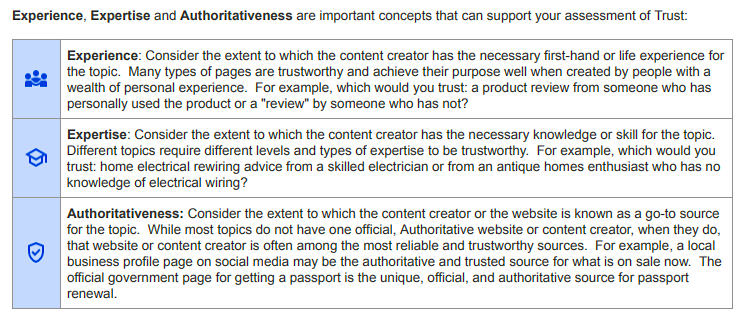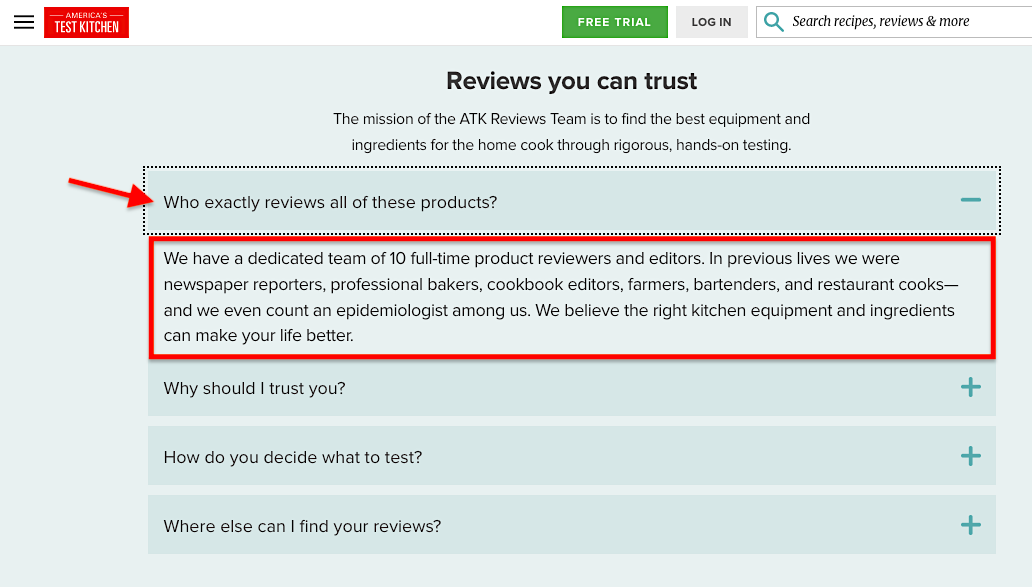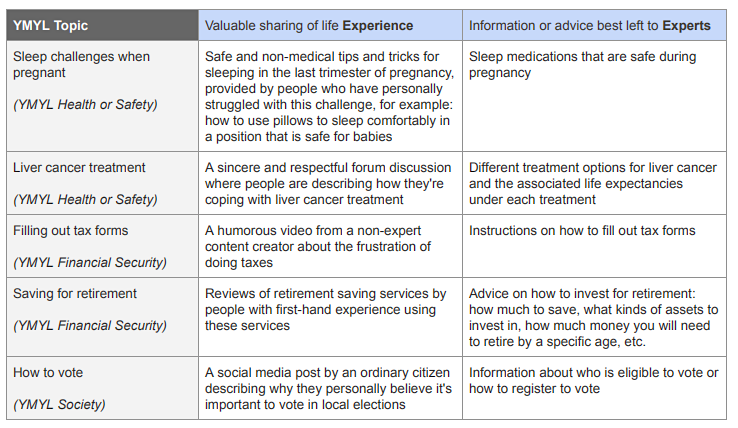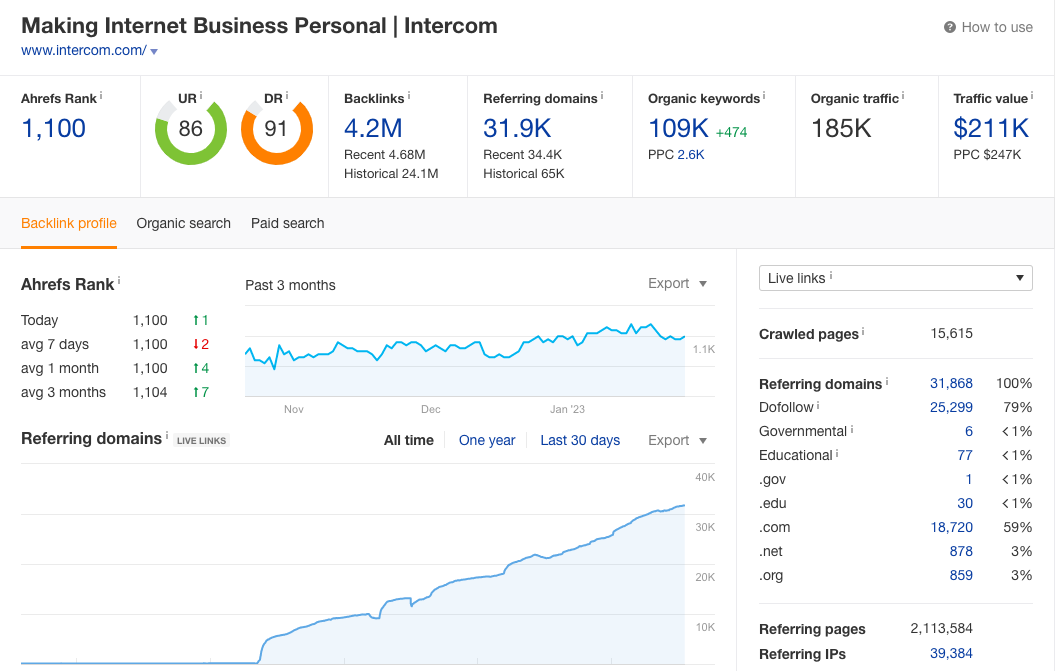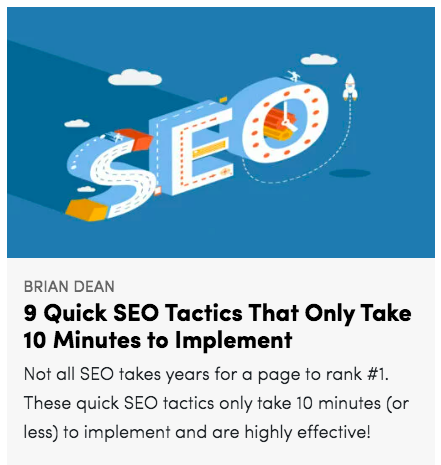Google E-E-A-T: How to Signal That You’re an Experienced Content Creator
[Free Consultation] Are you spending money on advertising but not getting the results you want? Are you looking for more sales and leads but have no idea where or how to start? Get help from our world-class marketing experts in a free consultation call.
Click Here To Schedule Your Free Consultation Now
Google’s Search Quality Rater Guidelines was recently updated just by adding an extra “E” to its previous acronym E-A-T.
What was known as the E-A-T principle is now E-E-A-T, which stands for Experience (there’s your new E), Expertise, Authoritativeness and Trustworthiness.
The recent Phantom update exemplifies the importance of E-E-A-T – especially first-hand experience – for content creators, which is now a more important than ever factor for ranking higher in SERPs.
In this post, we’ll discuss what you need to know about E-E-A-T and how to use it to improve your SEO and rank your content better.
What Is the Phantom Update?
Before we dive in, let’s review Google’s Phantom update.
The 2015 Phantom Update got its name because at first Google would not admit that it happened. They buried their head in the sand and didn’t acknowledge the changes in their search algorithm.
But since then, Gary Illyes, a Google Webmaster Trends Analyst, has stated that “Phantom” updates simply mean a broad change to Google’s entire ranking algorithm:
Shortly after the first Phantom Update was released, a copy of the Google Search Quality Evaluator Guidelines got leaked, and they responded by releasing the whole document in November of 2015.
The document explained that besides evaluating user experience and penalizing sites for excessive pagination and annoying pop-up ads, Google is also looking at who wrote the web content.
In other words, they want to know: Does the writer of each piece of content actually know what they’re talking about?
That’s where the E-E-A-T principle comes into play.
Related Content: What Is the Google BERT Search Algorithm Update?
What Is the Google E-E-A-T Principle?
The E-E-A-T model is the upgraded version of what was previously known as (and is sometimes still called) E.A.T. The change happened in December of 2022, along with a few other smaller updates in Google’s Searcher Quality Ratings Guidelines.
The E-E-A-T concept essentially assesses how trustworthy a particular article may be, based on a few different factors. It evaluates the website itself that published the article, along with the authority of the individual writer.
This is what E-E-A-T stands for:
- Experience. This assesses whether or not the author has personal experience with the topic at hand. Examples may be using the product being discussed or working in the field of the topic. It’s clear that there are plenty of “best of” curated product reviews that the author has never actually tested themselves, making them near pointless to read.
- Expertise. Does the content creator have the necessary knowledge or skill for that topic? As Google puts it, “different topics require different levels and types of expertise to be trustworthy.” I’d much rather get advice on insect bites from an actual doctor than from my grandmother, who swore up and down that putting nail polish on tick bites would heal them quickly.
- Authoritativeness. To what extent is the content creator or the website known as a go-to source for the topic being discussed? High-quality authors who create strong content with plenty of references in one subject over time gain authoritativeness. Most topics on a site with .gov in the website address, for example, will take precedence over third-party sources.
- Trustworthiness. Trust is the most important element here, and it determines how honest, safe, reliable and accurate a specific page is. For instance, having secure payment systems, trust badges, honest customer reviews, and accurate informational pages are crucial here.
Why Does E-E-A-T Matter for Users?
E-E-A-T is not just some abstract Google algorithm, it’s huge for the user experience. The better the user experience is, the more they’ll come to trust the results they find in the SERPs. Win-win for everyone: Users, brands and Google.
The reality is that people make huge life, health and purchasing decisions based on what they find on Google. So they want to know that the articles appearing on the first page of the search engine will be reliable and trustworthy and actually give them the information they need.
Suppose you’re reading an article about how to plan for retirement. In that case, you’d prefer the material to be written by a fiduciary with a financial background and not just a freelance writer getting paid $.05 a word who doesn’t even know what the word “fiduciary” means. Even worse, it could be written by a scam company that tricks people into “investing” with them and then just taking their money.
The point is: If people don’t trust that the top information in the SERPs is accurate, thorough and written by an expert, Google will have a huge problem. That’s why E-E-A-T is crucial for both users and Google.
What’s Different Between Google E-E-A-T and E-A-T?
The biggest and most obvious difference between E-A-T and the newer E-E-A-T is the addition of the extra “E.”
The new E stands for “experience,” which works to assess how much first-hand experience the author actually has.
It’s common, for example, for well-established sites to have curated lists of “best” products in a niche, everything from The Best Bath Pillows in 2023 to The Best Project Management Tools You Need in Your Tech Stack.
Many of the posts, however, clearly say “other reviews mention” and indicate that they’ve never even tried the products themselves:
These posts are going to be inferior to reviews that come from brands like America’s Test Kitchen, where experts actually put different products in a category to the test:
The other highlight is the emphasis on “trust” as the most important part of this model:
As Google puts it:
“The most important member at the center of the E-E-A-T family is Trust… because untrustworthy pages have low E-E-A-T no matter how Experienced, Expert or Authoritative the content may seem. For example, a financial scam is untrustworthy, even if the content creator is highly experienced and an expert scammer who is considered the go-to source for scams.”
Google’s guidelines have details about how they evaluate the reputation of websites and content creators, including what it means for content to be considered as “harmful.”
You can see these in the examples of low quality pages below:
How to Succeed with Google E-E-A-T
Want to rank higher in the SERPs? Then you need to be factoring E-E-A-T into your content creation process.
Most brands that are dedicated to publishing high-quality content do this already. They’re either creating quality, trustworthy resources themselves or working with expert writers who are already established in the particular niche.
In addition to that, there are also a few specific steps you can take to improve your E-E-A-T performance. Let’s take a look at each.
1) Publish Content in Your Area of Expertise (Especially if You’re a YMYL Site)
The first step to becoming an expert is to write in your area and level of expertise.
But what makes you an expert? Will Google actually check Harvard files to verify that you’re a professional lawyer before rewarding your content with page one rankings?
Not necessarily. Google explains in their General Guidelines handbook the difference between “sharing of life experience” and “advice best left to experts”:
This category of content is referred to as YMYL topics (Your Money or Your Life), and includes::
- News and current events: News about important topics such as international events, business, politics, science, technology, etc. Keep in mind that not all news articles are necessarily considered YMYL (e.g., sports, entertainment, and everyday lifestyle topics are generally not YMYL). Please use your judgment and knowledge of your locale.
- Civics, government, and law: Information important to maintaining an informed citizenry, such as information about voting, government agencies, public institutions, social services, and legal issues (e.g., divorce, child custody, adoption, creating a will, etc.).
- Finance: Financial advice or information regarding investments, taxes, retirement planning, personal loans, banking, or insurance, particularly webpages that allow people to make purchases or transfer money online.
- Shopping: Information about or services related to research or purchase of goods/services, particularly webpages that allow people to make purchases online.
- Health and safety: Advice or information about medical issues, drugs, hospitals, emergency preparedness, how dangerous an activity is, etc.
- Groups of people: Information about or claims related to groups of people, including but not limited to those grouped on the basis of race or ethnic origin, religion, disability, age, nationality, veteran status, sexual orientation, gender or gender identity.
- Other: There are many other topics related to big decisions or important aspects of people’s lives which thus may be considered YMYL, such as fitness and nutrition, housing information, choosing a college, finding a job, etc. Please use your judgment.
Take a look at Intercom, for example. They’re a customer messaging platform and regularly publish in-depth content on that topic on their blog:
Google is much more likely to view Intercom as an expert in their industry because of this content. And—you guessed it—Intercom is rewarded for their authoritative content with over 185K visitors arriving to their site each month from organic search:
How to Prove You’re a Subject Expert
So, how do you create content that proves to Google you’re a subject matter expert?
You’ll need to check these 5 things off your content to-do list:
- Details: Your content should provide detailed information—even if it’s brief. It should include all the steps necessary to complete a do-it-yourself task, for example. A partial or “fluff” list will earn a lower ranking. (Just Google “how to…” to see for yourself.)
- Value: An article must contain information of value—whether that’s news, a new development or comprehensive explanations or instructions.
- Well written: Content being published to your website should be engaging and well articulated, and the author should have an excellent grasp of their language.
- Well edited: All content on your site should be free of typos, misspellings, misused words and punctuation errors. All these things hurt the authority of the content as well as the website and should be avoided—even if that means hiring an editor and/or proofreader for your content creation department.
- Good user experience: The person arriving on your site shouldn’t be assaulted with ads or pop-ups, and articles shouldn’t be excessively spread out. (For example: “30 Things You Didn’t Know about Hollywood. You Won’t Believe Number Seven!” and then spread the content out over 30 pages to force the reader to click “next” over and over.)
It’s worth evaluating your site’s Domain Rating, citation flow, and trust flow using tools like Ahrefs and Majestic as you do this. Track these as your attempts to create authoritative content continue, and watch your SEO metrics skyrocket when Google begins to view you as an expert.
Learn More:
* Absolutely Everything You Need to Know About 10x Content
* 6 Tips for Scaling Up Content Production without Sacrificing Quality
* The Skyscraper Technique: How to Build High-Quality Backlinks to Your Content
2) Invite Authoritative Guest Bloggers to Contribute to Your Website
Just because you don’t have time to write things, or you’re not the most experienced person in your industry, doesn’t mean you can’t still publish expert content by experienced writers.
It’s called guest posting.
You can open up your website to external contributors to help build your library of authoritative content. Freelance writers, guest bloggers and other experts might be happy to write a high-quality piece of content in return for a backlink. And having their name, which is already respected in the industry (and by Google) attached to your website could be the perfect starting point.
For example: Here on the Single Grain blog, we need to persuade Google that we’re experts in digital marketing if we’re to improve our search ranking factor for marketing-related topics.
So instead of creating all our content using in-house resources, we open our blog to guest bloggers who are experts in the same industry—like this post on quick SEO tactics by Backlinko’s Brian Dean:
In return, Google sees an already-established marketing pro associate themselves with our website. Therefore, some of Brian’s reputation passes onto ours, and Google begins to believe that Single Grain is a website run by marketing experts. (Which, spoiler alert: We are!)
To do this for your own website, simply put together a “Write for Us” page that details how an expert can get in touch with you, like ours:
Or use a tool like Emplifi (formerly Social Bakers) to find experts in your industry, and ask whether they’d be interested in writing a post for your website. You might have to give a few contextual backlinks in return, but it’s a sweet deal for the authoritative content with which you’ll impress Google.
Learn More: The Power of Guest Blogging (And How to Get Started!)
3) Create a Strong, Authoritative Bio Page on Your Site
You work hard to make your website appear credible to Google. You’re inviting guest bloggers to contribute and hitting the “publish” button on blog posts you’re truly proud to have written.
There’s one more thing you need to do to cater to E-E-A-T guidelines: Create author biography pages that tie your blog posts to a real person.
Remember how we mentioned earlier that Google looks at the expertise and first-hand experience of the person behind each blog post? The author bio page is a simple way to showcase this expertise.
Just write a small blurb about the author, including special (relevant) information like:
- Their qualifications
- Their awards
- The college where they studied your industry
- Their job title
- The company for which they work
Take a look at the author bio for one of our freelance writers, Ana Gotter. She is an “expert business writer,” a “regular contributor” at well-known websites and she has “multiple marketing certifications.” There’s also a link to her site for more info:
The best part? Some WordPress theme settings automatically create author bio pages for every author on your website. All you need to do is head into the page, write a short description about the person behind your content, and allow Google to crawl it.
4) Contribute Guest Posts on Industry Websites with Your Author Bio
Following on from guest blogging, you should start spreading your eggs (i.e. content) across multiple baskets (i.e. websites) to really prove to Google that you’re an author who knows what they’re talking about.
Google looks at the author of each page, so along with making your website more credible, your personal name needs to have a strong connection to your topic, too.
If you haven’t already, find websites in your industry that are open to guest posts using one of these search queries:
- [INDUSTRY] + “write for us”
- [INDUSTRY] + “contribute”
- [INDUSTRY] + “submit”
- [INDUSTRY] + “guest post”
Then, plug the domains you find into an SEO tool like Ahrefs or Moz Link Explorer to judge whether the site is already well-respected by Google.
I’d advise aiming for sites with a DR or DA of over 40:
Carefully follow the guidelines that each of these “write for us” pages includes, and work with the editors to create a highly authoritative, detailed piece about a topic in your industry.
Oh, there’s just one more thing to remember when guest blogging:
Make sure you get a byline (your name) as opposed to “Guest Writer” or under an in-house writer’s bio—preferably with a link back to your site.
Do this a few times each month and Google will start to view your name as an expert in your industry. Then start to branch further afield and position your name on sites like:
- SlideShare to publish and promote your presentations
- Medium to publish and distribute your own articles, as well as curate others’ articles
- Contently, an “industry leader in creating, distributing and optimizing content,” that curates your content for you
- Amazon or Goodreads if you’re an author, which lists your publications and reader reviews
Learn More:
* How to Establish Yourself as a Reputable Freelance Writer
* My Site’s DR Is 1.2 but My Article Ranks #1 in Google!
5) Consider Using Structured Data to Add Author Info to Your Site
Structured data (also known as “Schema markup” or just “Schema”) allows you to add information to your website in a way that’s easy for Google to crawl and understand.
Here’s an example of how web pages with schema markup for events appear in the SERPs:
To put it simply, it is spoon-feeding Google and telling them exactly who your authors are so they can make connections they may not have otherwise, including recognizing established guest posters.
Here are a few helpful schema markups:
- The Organization schema can be useful, especially if your site is already established and often ranks well.
- The Person schema is a good one here. It allows you to add author information like credentials or awards earned, occupation and job title, and their brand for Google to read.
- The Author schema is also a good one, because it tells Google exactly who has written the content:
You can learn more about how to add author data through Schema markup here.
Related Content:
* How to Prepare Your Site for the New Google Page Experience Update
* 10 Most Important Google Ranking Factors (& How to Optimize for Them!)
* CWV Update: Why Google Keeps Changing How It Measures Your Site’s UX (and What to Do About It)
Final Thoughts on Google E-E-A-T & Phantom Update
Becoming an expert content creator according to Google’s Phantom Update will take time and planning. But if you’ve been building your area of expertise for a while, you have likely already laid the foundation for this.
(If you haven’t, start right now. It’s not too late!)
Make sure that you keep the new E-E-A-T principle in mind, and that you prioritize trust above all else as you create helpful content. That’s the central part of the new update, even with the addition of the extra “E.”
Google will continue to look at expert credentials for each new piece of content you post. Establishing your personal and website authority truly is the key to succeeding with content marketing and your SEO strategy in 2023 and beyond.
Want help increasing your site traffic? We can help! Just click the orange button below 👇
Additional contributions by Elise Dopson and Ana Gotter
Google E-E-A-T FAQs
Why is E-E-A-T important for SEO?
E-E-A-T is important for SEO because it helps determine a website’s rank in Google’s search engine results pages (SERPs). A high E-E-A-T score can result in improved visibility and higher traffic to a website.
How can I improve my website’s E-E-A-T score?
Improving your website’s E-E-A-T score requires demonstrating experience, expertise, authoritativeness and trustworthiness in your niche. This can be achieved by creating high-quality content, having a professional website design, building credible links, and demonstrating expertise and personal experience through industry credentials and publications.
What are the components of Google E-E-A-T in more detail?
- Experience refers to a content creator’s first-hand experience with a subject.
- Expertise refers to the knowledge and skills necessary to produce high-quality content.
- Authoritativeness refers to an author or website’s reputation as a credible source of information.
- Trustworthiness refers to an author or website’s reputation for providing accurate and trustworthy information.
How does E-E-A-T impact my website’s rankings in Google search results?
Google uses E-E-A-T as a ranking factor in its search algorithms to determine the quality of a website’s content and its relevance to a user’s search query. A high E-E-A-T score can result in a higher ranking and improved visibility in search results.
Can Google E-E-A-T scores change over time?
Yes, E-E-A-T scores can change over time. Google’s algorithms are constantly evolving, and a website’s E-E-A-T score can be affected by new information or changes to the website’s content or reputation. It is important to regularly assess and improve your website’s E-E-A-T score to maintain its visibility in search results.

